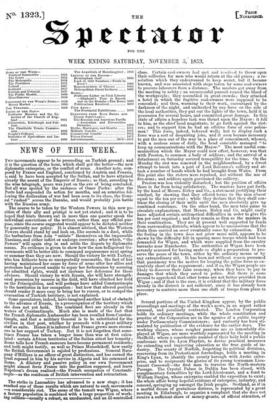NEWS OF THE WEEK.
Two movements appear to be proceeding on Turkish ground ; and it is the question Of the hour, which shall get the better—the new diplomatic enterprise, or the conflict of arms. Another note, com- posed by France and England, sanctioned by Austria and Prussia, is said to have been scored by the Sultan, and to have attained already the assent of the Emperor of Russia ; so that, according to the wise telegraph, peace was just on the eve of being concluded. Bat all was spoiled by the rashness of Omer Pacha : after the Porte had suspended its action for months, and an armistice fol- lowing the declaration of war had been seen to its close, the Gene- ral "rushed" across the Danube, and would probably join battle with the Russian army. The course to be taken by the Western Powers in this new po- sition of their ally and protégé is not yet stated; and it is to be hoped that hints thrown out in more than one quarter speak the indiviclikal convictions of the writers rather than any official pur- pose, since the course suggested would appear to be dictated neither by generosity nor policy. It is almost advised, that the Western Powers should stand by and look on, like seconds in a duel, while the barbarians from Asia "satiate" themselves on the impassable Russians, and either inflict or undergo coercion ; after which, "the Powers" will again step in and settle the dispute by diplomatic means. No evidence is given to show how the non-belligerent Go- vernments will be better able to command acquiescence next spring or summer than they are now. Should the victory lie with Turkey, who has hitherto been so unexpectedly reasonable, the fact of her having maintained her cause by force of arms after her allies and protectors had proved unable to repay her forbearance by securing her admitted rights, would not increase her deference for those advisers. Should victory lie with Russia she will have strength- ened possession by success in the field, will have clinched her hold on the Principalities, and will perhaps have added Constantinople to the territories in her occupation : but how that altered position should render it more easy- to bring her to reason, or to compel the evacuation of Turkish territory, is not explained. Some speculators, indeed, have imagined another kind of obstacle to the advance of Russia, in a preoccupation of the territory which she does not yet hold. The combined fleet are already in the waters of Constantinople. Much also is made of the fact that the French diplomatic Ambassador has been recalled from Constan- tinople, and that a military General is to be substituted for the civilian in that post, whither he proceeds with a great military staff as suite. Hence it is inferred that France grows more strenu- ous in her support of Turkey. But it is not forgotten that some- times France has taken a longer lease than was at first calcu- lated: certain African territories of the Sultan attest her tenacity; Rome tells how French succours have become permanent residents; and both might testify, as well as Prince Menschikoff, how easily the British Government is cajoled by professions. General Bara- ffnay dailliers is an officer of great distinction, and has earned the trust reposed in him by his service in Algeria and his command at Rome. A dilatory and passive policy in our own Government might almost force France into the position supposed, and leave Napoleon's dream realized—the French occupation of Constanti- nople—as the residuum of British intervention and retraetation.


























